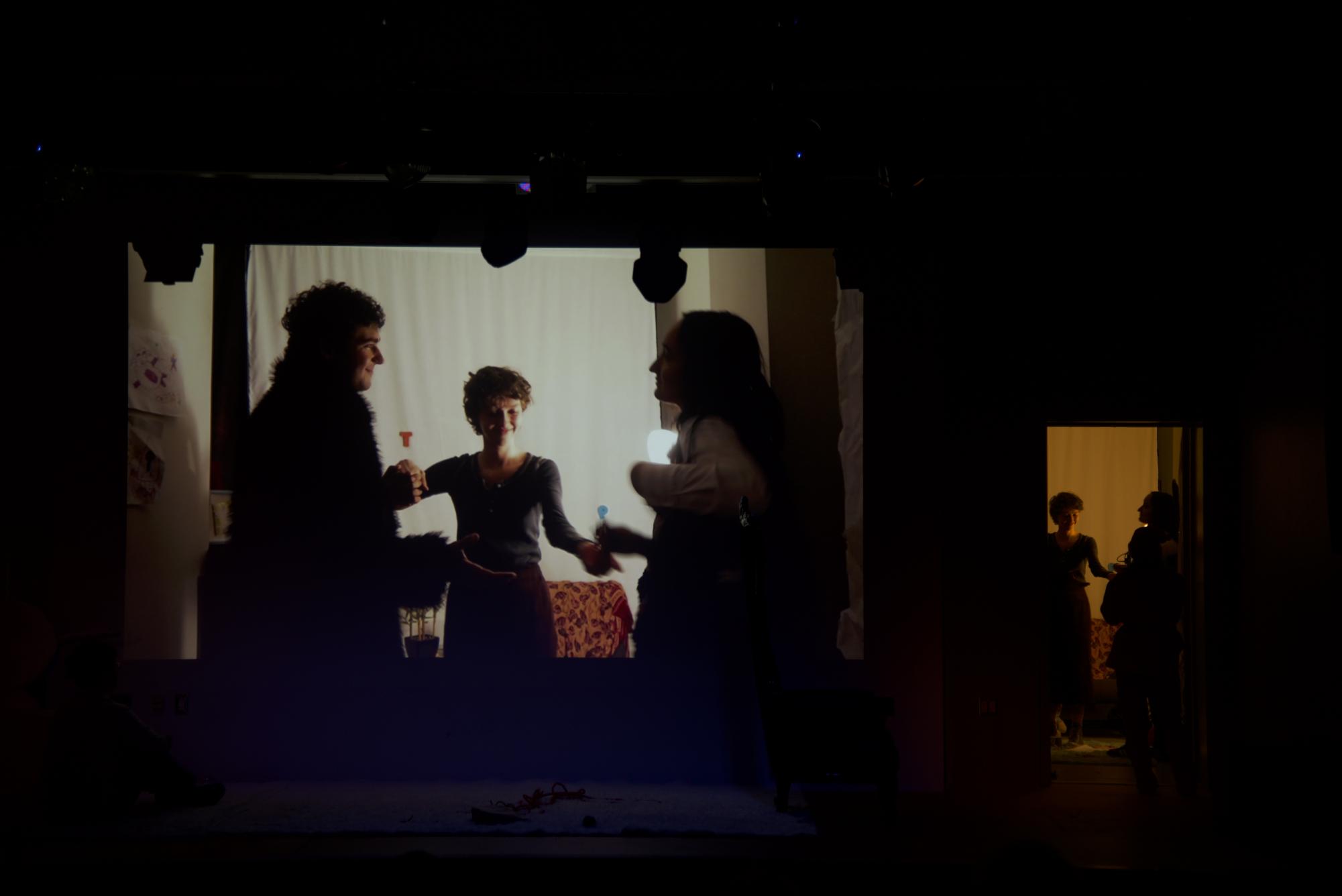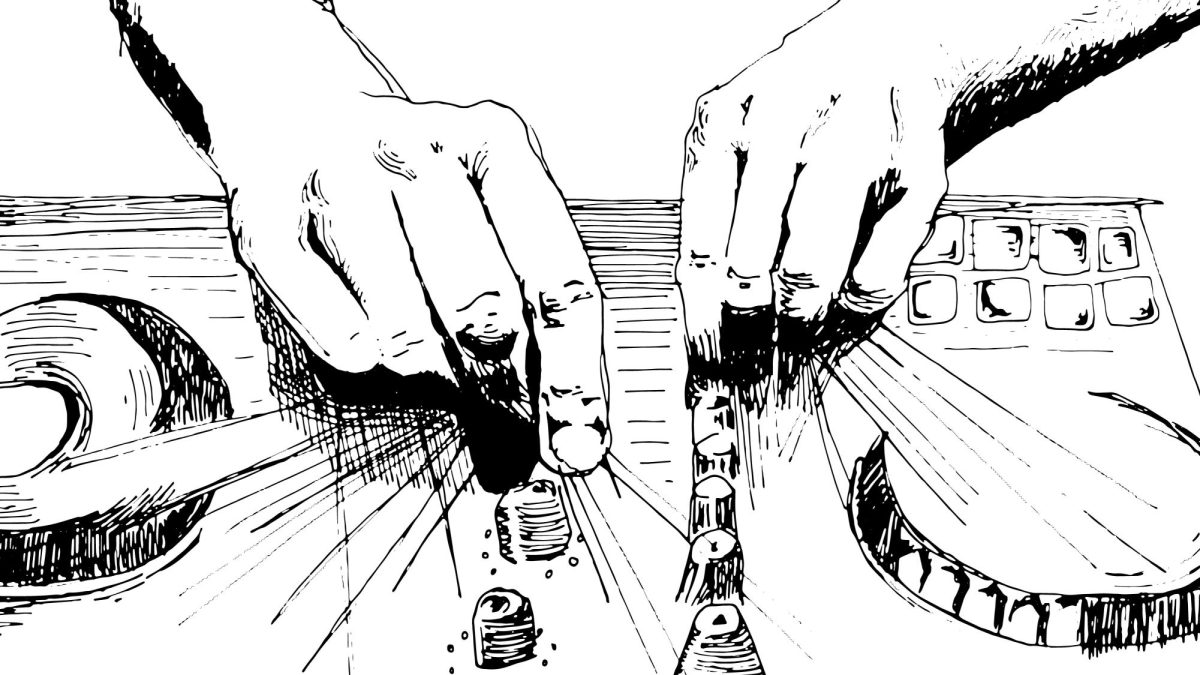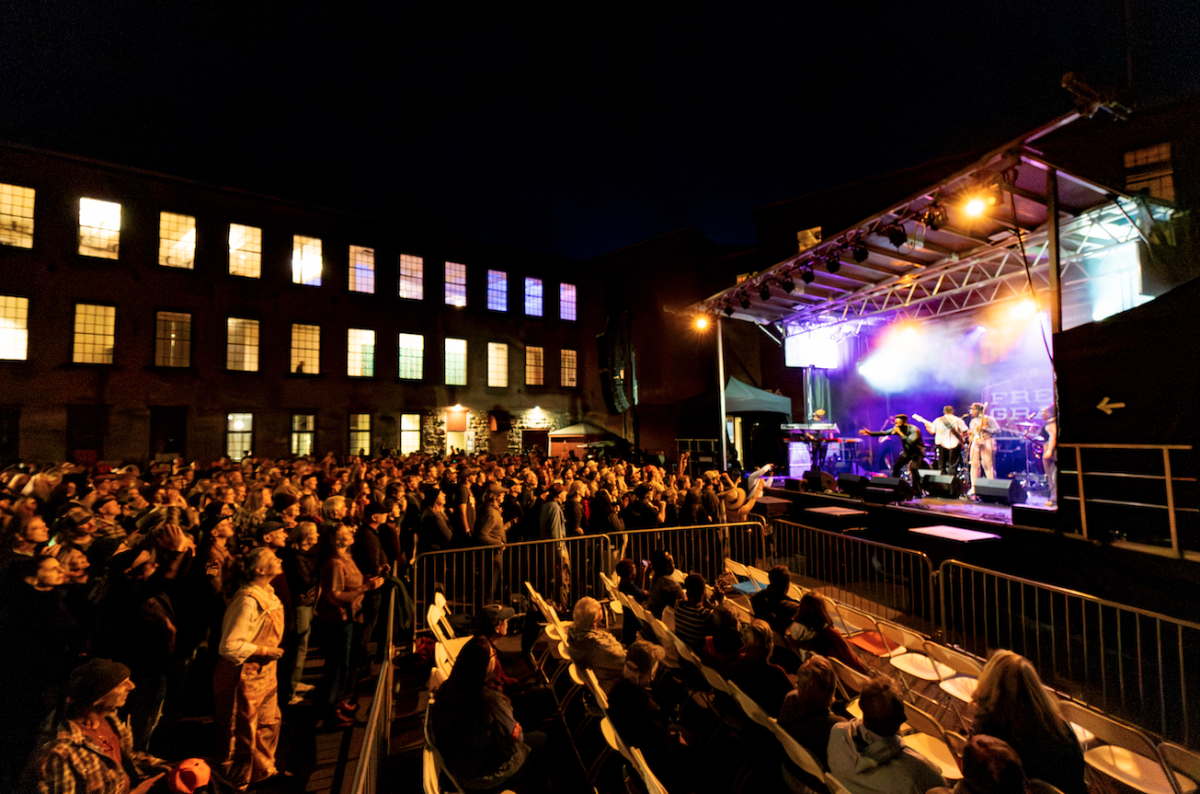
On both Friday and Saturday night, the audience of Maul, an original play written by Jack Allen Greenfield ’27 and directed by Leo Yihan Wang ’27, smiled and waved at the camera watching them from the stage. With a nearly imperceptible lag, fellow audience members’ faces peered back at them from a projection of the video on the back wall of the stage. Just under an hour later, as the stage lights dimmed and winked out, ending the avant-garde theater performance, a wave of stunned amazement rolled over the crowd. The auditorium was abuzz with accolades, and several viewers made plans to return the following evening.
Maul, produced by Cap & Bells, blends humor and gravity to create a satirical depiction of regular people. The play centers around Abel, played by Spencer Rodman ’28, as he navigates the complex dynamics of his home, workplace, and memories. Greenfield’s exploration of quotidian problems takes place in the typical, all-American mall where Abel works part of the year as a mall Santa. The plot’s inciting event comes when Abel’s ex-wife and the manager of the mall, Jaila, played by Sophia Rothman ’25, purchases an AI robot, Santobot, played by Sophie Messinger ’27, to replace him.
Santobot’s mechanical voice announces the beginning of the show to the audience, followed by the entrance of Abel, Jaila, Barry — another employee of the mall, played by Ronald Deng ’28 — and Mia, Abel and Jaila’s adult daughter, played by Charlie Smith ’25. After their entrances, Smith marks the opening scene of the play by reciting “The Clock Man,” a poem-turned-nursery rhyme by Shel Silverstein, in a lilting round.
As Maul progresses, each character develops depth. Abel is, in his own words, “old” and “depressed,” and struggles to contend with the passage of time and the accompanying changes to his life. Jaila is stuck in the frustrating monotony of work, unable to escape: In one of the play’s first scenes, she repeatedly assures a concerned caller that “No, [the mall’s] fake snow does not contain peanuts.” Barry does squats and chats with his prickly coworkers to make his work life interesting. Mia, a poetry teacher, is somewhat estranged from Abel, who struggles to accept her transgender identity. Santobot, once out of the cardboard box, endeavors to become Abel and, in so doing, discovers the flaws of humanity.
Maul’s bare bones set — consisting of a large black armchair, Christmas decor, and a rug — allowed the audience a full view of the stage’s back wall, upon which live film from the handheld camera that originally recorded the audience was projected for the entirety of the performance. Wang explained that his choice to add a video aspect to the production was inspired by productions he had recently seen in New York City and across Europe. “Film is a really interesting medium, especially when you do a live camera on stage that creates [multiple] levels — that kind of meta-ness you just can’t explain, but you can feel it,” he said.
Throughout Maul, the camera, held by Santobot, pans over the characters as they interacted with each other, often resting on Abel’s face and body. In one particularly salient scene, the family enters a side room to act out one of Abel’s memories. Though they are no longer on stage, Santobot follows the three characters, allowing the audience to see the scene through the film. “We use the camera as a device to portray Abel’s death, Abel’s rejection [of Mia], Abel’s sadness,” Wang said. “That creates a very stunning visual.”
The production grounds itself in the absurdity of real life, comparing the mundane experiences of working in the service industry, arguing with one’s ex-spouse, and witnessing the marching-on of time with the nonlinearity of recollection. “[The memories are] not real — that didn’t happen on stage, that didn’t happen at a time,” Wang said of the closet scene. “But Abel decided to walk into the memory.”
Before landing on the choice to project live film, Wang and the rest of the production team, including Associate Director Jane Su ’26 and Stage Manager Matthew Kohn ’28, explored other innovative visual techniques. According to Wang, they originally considered confining Abel to his armchair for the entire play in order to create the surreal mood they were looking for.
The avant-garde use of film in live theater meshed with the characters’ bizarre, and often intentionally erratic, behavior. According to Wang, the imaginative take on Greenfield’s script, in part, came out of the production team’s struggle to produce the show with limited resources. “One of my priorities is ‘How do I push artistic boundaries within the Cap & Bells community, within the theater community?’” Wang said. “Then [we] use the limited budget to do cool stuff that has never been done [at the College] before.”
Greenfield said that his creative process focused on character building rather than production design, affording his collaborators autonomy over the rest of the creative process. “[Script writing is] just making characters, and that’s it,” he said. “You leave the work up to the designers, you leave the work up to the directors, you leave the emotions up to the actors, and you just put these people on a page and say, ‘Okay, what do they say to each other? Why are they saying it? And how are they saying it?’”
Greenfield’s favorite part of working on the show was building relationships with the cast and crew. “Theater is all about connection. I spent so long writing this play by myself,” he said. “It was interesting, but also very miserable. I just feel so grateful to be able to go to a rehearsal and talk.”
Despite having its rehearsal timeframe condensed into just four weeks, the production process was remarkably low-stress, Rodman explained. “[Maul was] one of, if not the best, rehearsal processes I’ve been through,” he said. “In terms of people just being amazing, it being a very chill laid-back sort of setting, but we were still getting everything done in an effective way, and everyone was being very supportive.”
Much of Maul’s on-stage aspects came together organically, Rothman explained. “I never took a single note in my script,” she said. “I don’t think any of us wrote down any of the blocking because … we just played around with the scene and did what felt natural.”
Greenfield said he was very impressed with the cast. “The six poetics of Aristotle [are] plot, character, thought, diction, song and spectacle,” he said. “The spectacle is in the acting. We don’t need the excess, you don’t need the superfluousness. [The cast is] just so talented.”
Though Maul ends violently — a playful nod to the intersection of the show’s titular verb and its setting — the message is resounding: everyone has their problems. As the verbal motif of “The Clock Man” sounded for a final time, the lights dimmed and the show ended. Greenfield summed up his script: “All the characters are understandable and empathetic, and also horrible, and hopefully funny.”
Editor’s note: Jane Su, the associate director of Maul and an executive editor at the Record was not involved with the writing or editing of this article.








